Jacob Silverman
description: an American journalist and author known for his writings on digital culture, including his book 'Terms of Service: Social Media and the Price of Constant Connection'.
9 results
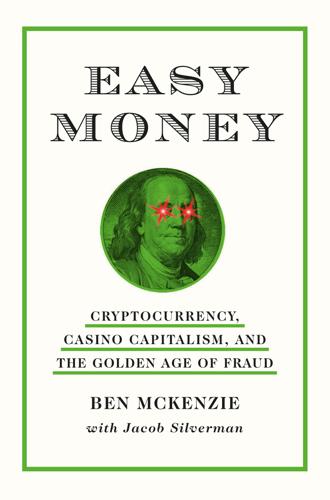
Easy Money: Cryptocurrency, Casino Capitalism, and the Golden Age of Fraud
by
Ben McKenzie
and
Jacob Silverman
Published 17 Jul 2023
., “On Scaling Decentralized Blockchains: (A Position Paper),” Financial Cryptography and Data Security (Springer, 2016), Lecture Notes in Computer Science, Vol. 9604, pp. 106–125. 19 Visa: Visa, “Security and Reliability,” https://usa.visa.com/run-your-business/small-business-tools/retail.html. 19 Argentina: Christina Criddle, “Bitcoin consumes ‘more electricity than Argentina,’ ” BBC.com, February 10, 2021. 22 Dan Davies: Dan Davies, Lying for Money: How Legendary Frauds Reveal the Workings of the World (Scribner, 2018), p. 260. 23 “minor celebrity”: Shiller, Narrative Economics, Preface, xii. 24 an article for the New Republic: Jacob Silverman, “Even Donald Trump Knows Bitcoin Is a Scam,” New Republic, June 7, 2021. CHAPTER 2: WHAT COULD POSSIBLY GO WRONG? 27 My first byline: Ben McKenzie and Jacob Silverman, “Celebrity Crypto Shilling Is a Moral Disaster,” Slate, October 7, 2021. CHAPTER 3: MONEY PRINTER GO BRRR 32 For our second journalistic collaboration: Ben McKenzie and Jacob Silverman, “Untethered,” Slate, October 17, 2021. 32 director of compliance for Excapsa: Stuart Hoegner, “Deputy GC, Director of Compliance, Excapsa, Jan 2006–Dec 2006,” LinkedIn profile, https://www.linkedin.com/in/stuart-hoegner/. 34 The Commodities Futures Trading Commission . . . had fined: Release Number 8450-21, “CTFC Orders Tether and Bitfinex to Pay Fines Totaling $42.5 Million,” October 15, 2021, https://www.cftc.gov/PressRoom/PressReleases/8450-21. 34 the New York Attorney General had fined: “Attorney General James Ends Virtual Currency Trading Platform Bitfinex’s Illegal Activites in New York,” February 23, 2021, https://ag.ny.gov/press-release/2021/attorney-general-james-ends-virtual-currency-trading-platform-bitfinexs-illegal. 34 Pierce was living with Collins-Rector: Joseph Menn, “Spain Arrests Fugitive in Molestation Case,” Los Angeles Times, May 18, 2002. 34 The fourth red flag for Tether: Tether, “Crystal Clear Fees,” https://tether.to/es/fees. 35 “a fraud can be called a ponzi scheme . . .”: Dan Davies, Lying for Money: How Legendary Frauds Reveal the Workings of the World (Scribner, 2018), p. 94. 35 multiple conflicts of interest: Bennett Tomlin, “Tether’s Executives are Deeply Conflicted,” Bennett’s Blog, September 13, 2021, https://bennettftomlin.com/2021/09/13/tethers-executives-are-deeply-conflicted/. 35 Giancarlo Devasini: Kadhim Shubber and Siddharth Venkataramakrishnan, “Tether: the former plastic surgeon behind the crypto reserve currency,” Financial Times, July 15, 2021. 36 The “fraud triangle” has three components: Donald Cressey, Other People’s Money: A Study in the Social Psychology of Embezzlement (Free Press, 1953). 37 Razzlekhan: Zeke Faux, “Did Razzlekhan and Dutch Pull Off History’s Biggest Crypto Heist?
…
ADDITIONAL PRAISE FOR EASY MONEY “Easy Money is a deceptively ambitious project—at once a riveting account of the financial crime of the century, and a thoughtful meditation on the nature of democracy and what we owe each other.” —ZACHARY CARTER, author of The Price of Peace “A superb and disturbing examination into the corrupt world of crypto. Ben McKenzie and Jacob Silverman take us on the road—from Austin to El Salvador—as they explore the bizarre new universe of finance that is filled with frauds and fakers, all of whom engage in extraordinarily high-level transactions that impact us all. This is The Big Short for our current times, an eye-opening expose of an industry that has consumed a new generation—with the endorsement of many famous celebrities—who don’t fully understand the economic perils that they face.”
…
When trust breaks down en masse, when misinformation spreads like a virus, when there are few institutions deserving of our faith or respect, when people view their only way to win as by making someone else lose, we find ourselves in perilous territory. Easy Money is a work of reportage, culled from hundreds of interviews, too many late nights of brain-melting research, and more than a few bizarre adventures in the world of digital funny money. My colleague Jacob Silverman and I have talked to people inside and outside of crypto, the titans of industry and the average Joes, believers, skeptics, victims, villains, and a few slippery figures who proved difficult to pin down. Although the story starts with me, this book is about them. Over the course of the next thirteen chapters, we will take you on a journey that begins in my tiny office in Brooklyn and rapidly expands to cover the globe.
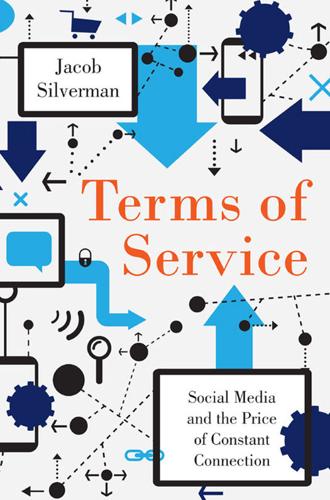
Terms of Service: Social Media and the Price of Constant Connection
by
Jacob Silverman
Published 17 Mar 2015
Among the most important goals are making sure that the first page of Google results are clean and that Google’s suggested search results aren’t harmful or defamatory. For example, when I type my name into Google, the four suggested search terms are “jacob silverman duff and phelps” (an executive at Duff & Phelps, a financial services firm, shares my name), “jacob silverman sxsw,” “jacob silverman twitter,” and “jacob silverman jeopardy,” none of which is cause for worry. If one of them had been “jacob silverman arrest,” I might have reason to look up a reputation defender. Some disgruntled Internet users have tried suing Google for these suggested search terms, but a more effective, cheaper method may just be searching many times for more positive terms in order to crowd out the ugly suggested terms.
…
Metal Rabbit Media creates fake online personas for some clients but using their same names, with the idea being that it might be more useful to obscure the client’s biography than to enhance it with fluffy material. When challenged, the client could always say that the Web sites must be describing another Jacob Silverman who served in two wars, published a sonnet cycle, and sits on the alumni board at Yale. Similarly, all those blog posts attacking Jacob Silverman for being an asshole and a tax cheat must be describing that other Jacob Silverman or still yet, a third Jacob Silverman. The effect is, as the journalist Graeme Wood put it, like Saddam Hussein’s body doubles: create multiple versions of the same person, so the real one will always be in doubt.
…
See Internet Wu, Tim, 2, 67 Yahoo, 28, 96 Yang, Zoe, 78–80, 81, 82 Y Combinator, 324 YouTube, 13, 15, 70–71, 84, 361 Zakas, Laimonas, 353–54 Zengotita, Thomas de, 120, 346 Zipcar, 236 Zuckerberg, Mark claims for Facebook, 6 on companies over countries, 6 on Facebook’s supply of data, vii on frictionless sharing, 12 on human beings as cells of a single organism, 12, 376n on maintaining two identities, 159 on privacy, 287–88, 292 Shreateh’s post on Zuckerberg’s Facebook page, 354–55 Zuckerberg, Randi, 159 Zuckerberg’s Law, 288 About the Author JACOB SILVERMAN’S work has been published in the New York Times, the Los Angeles Times, Slate, the Atlantic, the New Republic, and many other publications. He is on the board of Deep Vellum, a publisher of international literature. In 2008, the Virginia Quarterly Review recognized him as one of the top literary critics under thirty. He lives in Brooklyn, New York. Discover great authors, exclusive offers, and more at hc.com. Copyright TERMS OF SERVICE. Copyright © 2015 by Jacob Silverman. All rights reserved under International and Pan-American Copyright Conventions.
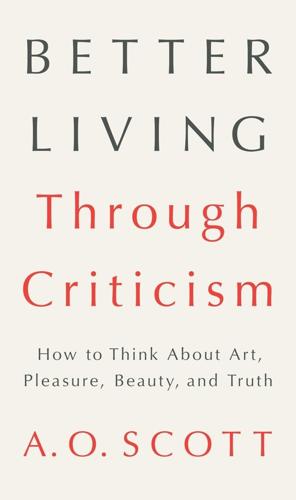
Better Living Through Criticism: How to Think About Art, Pleasure, Beauty, and Truth
by
A. O. Scott
Published 9 Feb 2016
Although there is no record of how the critics of prehistory were received or what they said—no Rotten Tomatoes aggregation preserved in cuneiform, no Charlie Rose roundtable captured on a cartouche—we can find a concise early indictment in the last sections of what survives of Aristotle’s Poetics, in a grumpy statement attributed to Glaucon (who as it happens was Plato’s older brother): “Critics,” Glaucon said (according to Aristotle), “jump at certain groundless conclusions; they pass adverse judgment and then proceed to reason on it; and, assuming that the poet has said whatever they happen to think, find fault if a thing is inconsistent with their own fancy.” In our own time, the world of book reviewing in particular undergoes periodic fits of anxiety about the manners of critics and the feelings of authors and readers. A few years ago Jacob Silverman, writing in Slate, complained that an “epidemic of niceness” was undermining literary culture, replacing the stringent work of judgment with an atmosphere of “clubbiness and glad-handing” rooted in the gooey, smiley etiquette of social media. Dwight Garner, my colleague at the New York Times, took to the pages of the Sunday Magazine to extend the point, arguing that the book world is awash in “yes-saying critics.”
…
More than forty years before that, in a Harper’s magazine essay that would serve as something of a manifesto for the soon-to-be-launched New York Review of Books, Elizabeth Hardwick made the opposite case. “A book,” she wrote, “is born in a puddle of treacle,” and the result was a decayed, flabby discourse. In 1959, according to Hardwick, books were patted on the head, cosseted, and praised for the sincerity of their efforts—more or less in the way that Heidi Julavits would later demand and Jacob Silverman and Dwight Garner would later, once again, decry. It would be a mistake to suppose that Hardwick’s argument prevailed for a while, and that book criticism grew fangs until Julavits came along to file them down, followed in turn by the quick sharpenings performed by Silverman and Garner, who were then punched in the mouth by the friends of Alix Ohlin.
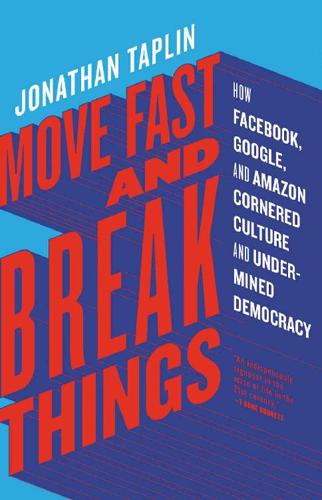
Move Fast and Break Things: How Facebook, Google, and Amazon Cornered Culture and Undermined Democracy
by
Jonathan Taplin
Published 17 Apr 2017
As Leon Wieseltier once wrote, “As the frequency of expression grows, the force of expression diminishes.” And as President Obama noted in a speech, “Ten, twenty, fifty years from now, no one seeking to understand our age is going to be searching the tweets that got the most retweets.” We certainly are not preparing our students for a career writing “sponsored content,” like the kind Jacob Silverman described in The Baffler: Also called native advertising, sponsored content borrows the look, the name recognition, and even the staff of its host publication to push brand messages on unsuspecting viewers. Forget old-fashioned banner ads, those most reviled of early Internet artifacts. This is vertically integrated, barely disclaimed content marketing, and it’s here to solve journalism’s cash flow problem, or so we’re told. “15 Reasons Your Next Vacation Needs to Be in SW Florida,” went a recent BuzzFeed headline—just another listicle crying out for eyeballs on an overcrowded homepage, except this one had a tiny yellow sidebar to announce, in a sneaky whisper, “Promoted by the Beaches of Fort Myers & Sanibel.”
…
Dan Kaminsky’s speech at the 2015 Black Hat Conference cited the NTIA report for his contention that 50 percent of Internet users are worried about security. National Telecommunications and Information Administration, “Lack of Trust in Internet Privacy and Security May Deter Economic and Other Online Activities,” May 13, 2016, www.ntia.doc.gov/blog/2016/lack-trust-internet-privacy-and-security-may-deter-economic-and-other-online-activities. Jacob Silverman, “Just How Smart Do You Want Your Blender To Be?” New York Times, June 19, 2016, www.nytimes.com/2016/06/19/magazine/just-how-smart-do-you-want-your-blender-to-be.html. Chapter One: The Great Disruption Jorge Guzman and Scott Stern, “The State of American Entrepreneurship: New Estimates of the Quantity and Quality of Entrepreneurship in 15 US States, 1988–2014,” March 2016, static1.squarespace.com/static/53d52829e4b0d9e21c9a6940/t/56d9a05545bf217588498535/1457102936611/Guzman+Stern+—+State+of+American+Entrepreneurship+FINAL.pdf.

Under a White Sky: The Nature of the Future
by
Elizabeth Kolbert
Published 15 Mar 2021
Precht, “White-Band Disease and the Changing Face of Caribbean Coral Reefs,” Hydrobiologia, 460 (2001), 25–38. In 1998, a so-called global bleaching event: Alexandra Witze, “Corals Worldwide Hit by Bleaching,” Nature (Oct. 8, 2015), nature.com/news/corals-worldwide-hit-by-bleaching-1.18527. “stop growing and begin dissolving”: Jacob Silverman et al., “Coral Reefs May Start Dissolving When Atmospheric CO2 Doubles,” Geophysical Research Letters, 36 (2009), agupubs.onlinelibrary.wiley.com/doi/full/10.1029/2008GL036282. “rapidly eroding rubble banks”: O. Hoegh-Guldberg et al., “Coral Reefs Under Rapid Climate Change and Ocean Acidification,” Science, 318 (2007), 1737–1742.

The Sixth Extinction: An Unnatural History
by
Elizabeth Kolbert
Published 11 Feb 2014
e360, published online Dec. 6, 2010. A recent study by a team of Australian researchers: Glenn De’ath et al., “The 27-Year Decline of Coral Cover on the Great Barrier Reef and Its Causes,” Proceedings of the National Academy of Sciences 109 (2012): 17995–99. “all coral reefs will cease to grow”: Jacob Silverman et al., “Coral Reefs May Start Dissolving when Atmospheric CO2 Doubles,” Geophysical Research Letters 35 (2009). in a square meter’s worth: Laetitia Plaisance et al., “The Diversity of Coral Reefs: What Are We Missing?” PLOS ONE 6 (2011). “that of most terrestrial animal groups”: Kent E. Carpenter et al., “One-Third of Reef-Building Corals Face Elevated Extinction Risk from Climate Change and Local Impacts,” Science 321 (2008): 560–63.
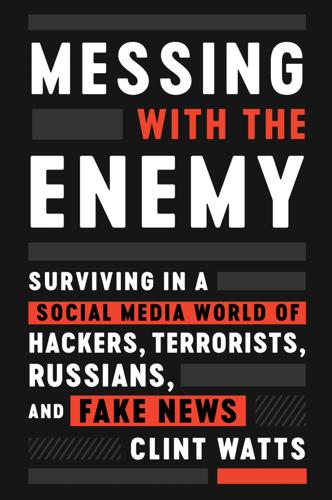
Messing With the Enemy: Surviving in a Social Media World of Hackers, Terrorists, Russians, and Fake News
by
Clint Watts
Published 28 May 2018
Thomas Shanker, “Defense Secretary Urges More Spedning for U.S. Diplomacy,” The New York Times (November 27, 2007). http://www.nytimes.com/2007/11/27/washington/27gates.html. 3. An overview of the U.S. Information Agency’s mission and activities can be found in this 1998 summary: http://dosfan.lib.uic.edu/usia/usia home/oldoview.htm#overview. 4. Jacob Silverman, “The State Department’s Twitter Jihad,” Politico (July 22, 2014). https://www.politico.com/magazine/story/2014/07/the-state-departments-twitter-jihad-109234. 5. Michael Lumpkin, “As ISIS Evolves, U.S. Counter-Efforts Must Advance, Lumpkin Says”, interview by Renee Montagne, Morning Edition, NPR, https://www.npr.org/2016/02/01/465106713/as-isis-evolves-u-s-counter-efforts-must-advance-lumpkin-says.

Radical Technologies: The Design of Everyday Life
by
Adam Greenfield
Published 29 May 2017
“Many 3D Patents Are Expiring Soon,” 3D Printing Industry, December 29, 2013, 3dprintingindustry.com. 32.Josef Průša, “Open Hardware Meaning,” September 20, 2012, josefprusa.cz/open-hardware-meaning/. 33.Johan Söderberg, Hacking Capitalism: The Free and Open Source Software Movement, Abingdon: Routledge, 2012. 34.Manon Walquan, “Un clitoris imprimé en 3D, une première en France,” Makery, July 26, 2016, makery.info/2016/07/26/un-clitoris-imprime-en-3d-une-premiere-en-france/; Carrefour Numérique, “Les réalisations du FabLab: Clitoris,” July 27, 2016, carrefour-numerique.cite-sciences.fr/fablab/wiki/doku.php?id=projetspercent3Aclitoris#photos See also ufunk.net/en/tech/imprimer-un-clitoris-en-3d/. 35.Jacob Silverman, “A Gun, A Printer, An Ideology,” New Yorker, May 7, 2013; See also Defense Distributed, defdist.org. 36.Liat Clark, “Australian Police: Exploding 3D Printed Gun Will Kill You And Your Victim,” Wired, May 24, 2013. 37.Robert Beckhusen, “3-D Printer Company Seizes Machine From Desktop Gunsmith,” Wired, October 1, 2012. 38.Ghost Gunner, ghostgunner.net. 39.Ateneus de Fabricació.
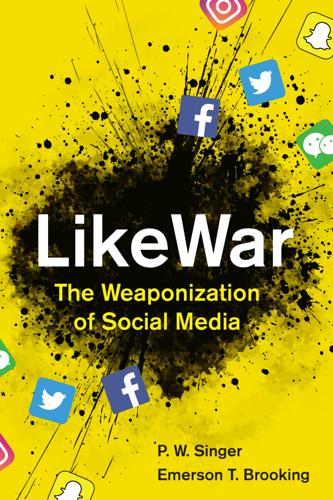
Likewar: The Weaponization of Social Media
by
Peter Warren Singer
and
Emerson T. Brooking
Published 15 Mar 2018
Moss Roberts (Monthly Review, 1977). 100 Mao envisioned: “Short Definitions of the ‘Mass Line’ and a ‘Mass Perspective,’” taken from Scott Harrison, The Mass Line and the American Revolutionary Movement, The Mass Line, http://massline.info/sum1p.htm. 101 hammered into a single vision: Ibid. 101 has made a comeback: David Cohen, “A Mass Line for the Digital Age,” China Brief (Jamestown Foundation) 16, no. 8 (2016), https://jamestown.org/program/a-mass-line-for-the-digital-age/. 101 Jingwang (web-cleansing) app: Oiwan Lam, “China’s Xinjiang Residents Are Being Forced to Install Surveillance Apps on Mobile Phones,” Global Voices, July 19, 2017, https://globalvoices.org/2017/07/19/chinas-xinjiang-residents-are-being-forced-to-install-surveillance-apps-on-mobile-phones/. 101 “electronic handcuffs”: Ibid. 101 “mutually helpful social atmosphere”: CCP Central Committee General Office, “ Opinions Concerning Accelerating the Construction of Credit Supervision, Warning and Punishment Mechanisms for Persons Subject to Enforcement for Trust-Breaking,” China Copyright and Media, September 25, 2016, https://chinacopyrightandmedia.wordpress.com/2016/09/25/opinions-concerning-accelerating-the-construction-of-credit-supervision-warning-and-punishment-mechanisms-for-persons-subject-to-enforcement-for-trust-breaking/. 101 unwavering loyalty: Jacob Silverman, “China’s Troubling New Social Credit System—and Ours,” New Republic, October 29, 2015, https://newrepublic.com/article/123285/chinas-troubling-new-social-credit-system-and-ours; “Planning Outline for the Construction of a Social Credit System (2014–2020),” China Copyright and Media, April 25, 2015, https://chinacopyrightandmedia.wordpress.com/2014/06/14/planning-outline-for-the-construction-of-a-social-credit-system-2014-2020/. 101 reflecting their “trustworthiness”: Silverman, “China’s Troubling New Social Credit System.” 101 “trustworthiness” score: Ibid. 101 mobile services like WeChat: Jonah M.